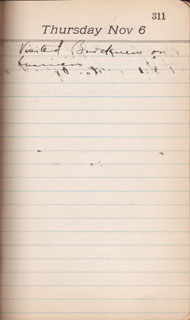
Just strolling about
visiting the Zionist
district and several
Zionist Clubs.
Just paid back the last
payment of the $100 that
I borrowed from the Heb.
Free Loan Soc.
It is a wonderful institution
and I shall not forget their
favor in my time of need.
—————
Matt’s Notes
The New York Hebrew Free loan society was founded in 1892 and, like many similar institutions that grew throughout the U.S. during the late nineteenth century’s wave of Eastern European Jewish immigration, saw interest-free lending as “an act of kindness considered superior to giving alms because a loan fosters self-sufficiency while preserving dignity.”1 This lending philosophy had biblical and spiritual roots (the Old Testament and the Talmud recommend it) and practical purposes (it was a sensible way to distribute small sums to large numbers of people who needed to get on their feet, negotiate crises, and start businesses). The borrower needed several endorsers to guarantee the loan, but the system worked so well that Hebrew free loan societies typically experienced a default rate of less than 1 percent.2
The reasons immigrants sought loans from the Hebrew Free Loan Society were as numerous and varied as the immigrants themselves (especially since the New York HFLS loaned money to all immigrant groups, not just Jews). In Papa’s case, the $100 loan he secured back in May went to help his family in the old country with funeral and living expenses in the wake of his father’s death. This was an unusually large sum for a non-business loan and obviously wasn’t easy for him to pay off, but I think the gratitude he expresses toward the Free Loan Society in today’s entry — in contrast to his straight-up relief he expressed when he paid recently back the $25 he borrowed from his cousin, Herman Breindel — is a testament to the institution’s efforts to preserve borrowers’ pride.
That’s not to say Herman wasn’t happy to lend Papa money, of course. Remember that, when Papa first came to America, Herman met him at Ellis Island, put him up, and helped him get on his feet. I wouldn’t be surprised if Herman sponsored Papa’s loan at the HFLS, either. But I think there might be something more in this entry than just Papa’s financial status. His mention of the support he received, coupled with his description his casual visits to all the Zionist clubs he associated with, reads like the account of a man who feels safe and at ease. Papa, who often felt so displaced, isolated and homesick, who has remained dreamily attached to his past at the expense of his present, seems at this moment to feel at ease among his adopted country, his neighbors, the extended family he’s created through his political activities and social life. He seems, in short, at home, at least for the day.
————-
References for this post:
1 – From the Hebrew Free Loan Society Web site
2 – “Culture and Context: The Emergence of Hebrew Free Loan Societies in the United
States” by Shelly Tenenbaum. From Social Science History, Vol. 13, No. 3. (Autumn, 1989).








